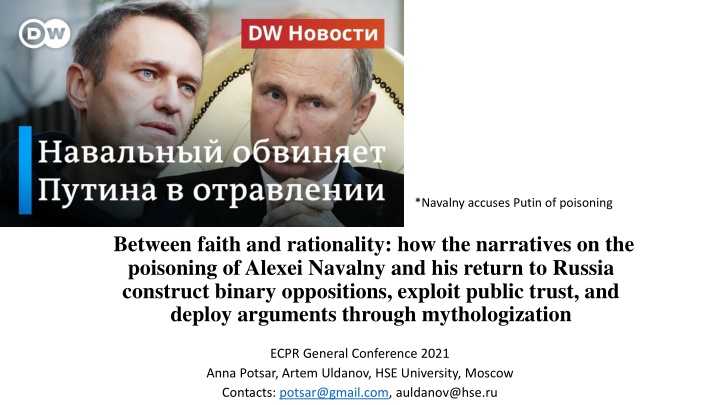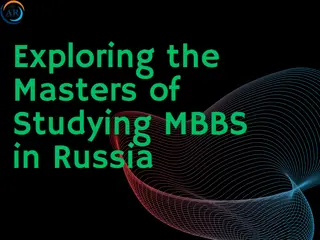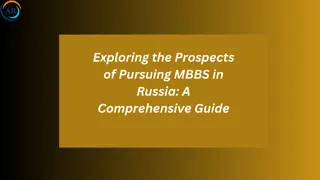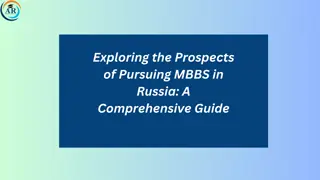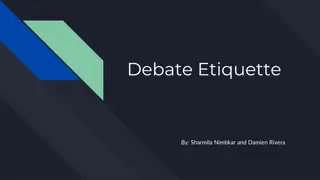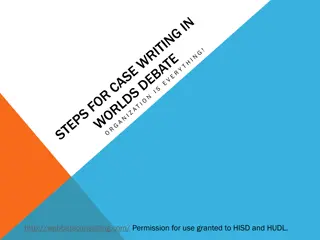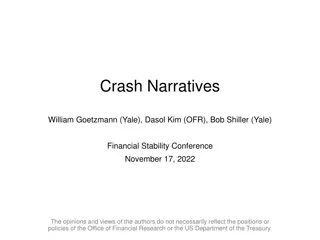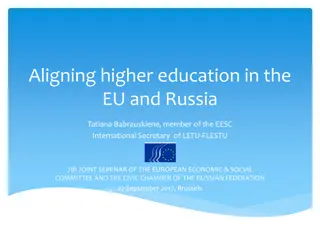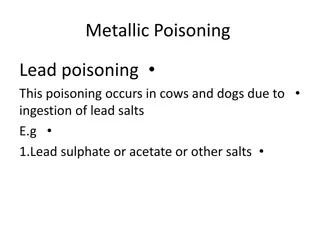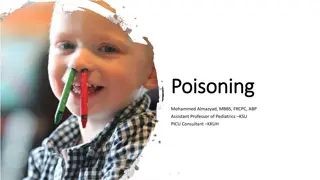Navigating Narratives: Analysing the Navalny Poisoning Debate in Russia
An analysis of the contentious narratives surrounding the poisoning, return, and arrest of Russian opposition leader Alexei Navalny, exploring how public debates construct binary oppositions, manipulate trust, and create alternative facts. Using discourse analysis and the Narrative Policy Framework, this study delves into the ideological dichotomy shaping policy debates in Russia.
Download Presentation

Please find below an Image/Link to download the presentation.
The content on the website is provided AS IS for your information and personal use only. It may not be sold, licensed, or shared on other websites without obtaining consent from the author.If you encounter any issues during the download, it is possible that the publisher has removed the file from their server.
You are allowed to download the files provided on this website for personal or commercial use, subject to the condition that they are used lawfully. All files are the property of their respective owners.
The content on the website is provided AS IS for your information and personal use only. It may not be sold, licensed, or shared on other websites without obtaining consent from the author.
E N D
Presentation Transcript
*Navalny accuses Putin of poisoning Between faith and rationality: how the narratives on the poisoning of Alexei Navalny and his return to Russia construct binary oppositions, exploit public trust, and deploy arguments through mythologization ECPR General Conference 2021 Anna Potsar, Artem Uldanov, HSE University, Moscow Contacts: potsar@gmail.com, auldanov@hse.ru
Introduction An imbalance between policy and politics is one of the features that could characterize authoritarian political regimes and Russia in particular (Gel man & Starodubtsev, 2016) Public issues cannot be resolved without an understanding that solutions to them are tolerable for the political regime (Noble, 2017) But policy debates are still going on and remain relatively free (depends on how sensitive a political issue is) The case of Navalny is quite sensitive still open for debates
How the cases of A. Navalny poisoning, and arrest could shed light on the nature of policy debates in Russia? This paper employs discourse analysis (DA) in combination with some elements of the Narrative Policy Framework (NPF) to a contentious debates on several recent events related to the proclaimed leader of Russian political opposition Alexei Navalny We seek to match DA and NPF to shed light on how the narratives about these events construct binary oppositions, exploit public trust and create alternative facts We present here a qualitative research project that examines texts from different media sources. These texts are recent publications (August 2020- May 2021) directly related to the events happened with Alexei Navalny This paper does not set a goal to investigate the nature of the Navalny s poisoning, return to Russia and arrest or disclose the actors responsible for them. Instead, the paper will focus on public debates on these issues and analyze the growing ideological dichotomy in the public sphere. We argue that by examining discourse elements and narratives constructed we can gain a more in-depth understanding of the policy debates conditions in which this contestation occurs than by employing the NPF or DA alone
A bright example The alleged poisoning of one of the most prominent Russian opposition leaders Alexey Navalny, his emergency extraction from Russian city Omsk to one of the medical clinics in Berlin and then his return to Russia that had ended in trial and prison term for him. These events were surrounded by enormous amounts of speculations, open debates, and conspiracies. Since the very moment of the poisoning in August 2020, the situation took an intense course where different narratives were focused on dramatic sides of the story. Several controversies around the poisoning and the return of Navalny to Russia have been interpreted in almost religious manner by one side of the debates and in attempts to ridicule the story by the other. Both pro and anti-Navalny narratives have similarities regarding trust, rationality, and personal nature of their statements. In general terms we can summarize them as: 1) President Putin is the official embodiment of the truth, Alexei Navalny is the embodiment of offensive lies. 2) Alexei Navalny is a symbol of truth and hope, while the President is a manifestation of total lie, corruption, and manipulation.
Data We will refer to the unit of analysis as a text or document, but it could apply to any unit of text: a tweet, Facebook status, spoken utterance, press briefing, sentence, or paragraph. To scrutiny the discourse strand we build, for each theme, a corpus of texts that is made from discourse fragments. Most techniques of discourse study begin in the same way with a series of preprocessing steps to reduce the awe-inspiring diversity of language to a manageable set of features. We will use texts on Russian language published from August 2020 to May 2021, because it was a period when most relevant texts have been issued. Since the debates over the related events happened not only in a traditional media, but also on the Internet and social networks ( Vkontakte , Facebook, Telegram, Youtube, Navalny s website, blog-platforms, etc) our main sources shall include them together with the websites of key Russian mass media and news channels (https://www.rbc.ru, https://www.kommersant.ru/, https://lenta.ru/, https://www.dw.com/ru/, https://www.vesti.ru/, https://www.meduza.io, etc).
Discourse and narrative Recognizing that language is central to the study of politics is not new. To the contrary, scholars of politics have long recognized that much of politics is expressed in words. The contested field is always the selection of the array for the research. Understanding the discourse as verbal activity immersed into social life, we see an umbrella term originating from the work of Michel Foucault from the 1970s and onwards, discourse is an analytical concept that acknowledges the active role of language in the production of knowledge and power through text and talk, genre and representation. The chain of events in the fictional world narrated by someone (narrator) not necessarily involved in these events. The substance of the event from a structuralist perspective is crucial for defining the narration and distinguishing it from other verbal forms. By the event we presume the change fitting the requirements of factuality and of performance. Policy narrative must contain policy context and a character Current research presumes that notions of discourse and narrative are interrelated, therefore research techniques applied to the discourse can be applied to the set of narratives retrieved from the discourse strand. The definition of a narrative as a chronological and sometimes causal sequence of discontinuous units; unfolding of an action, change, difference (Tsvetan Todorov, 1969) obviously presents it as a substantial part of discursive practices along with descriptive and argumentative speech acts / utterances / texts pursuing alternative goals.
How the NPF could help us to improve the analysis? For this study we are particularly interested in one of the narrative strategies theorized by the NPF and in analysis of some structural elements of narratives, namely plots and characters. According to the framework, policy actors can also use several narrative strategies to influence public policy. The literature on the framework focuses on three main narrative strategies: the scope of conflict, the devil-angel shift , and causal mechanisms (Shanahan et al, 2017). We are specifically interested in the last one, because it will help to enhance our discourse analysis with the focus on intentions and representation of causality in the narratives.
Ungrounded Accusations and Invectives Lies and hypocrisy are the most effective mechanisms of work. Corruption is the foundation of trust. The most reliable friends are those who have been stealing and cheating with you for many years. We look worse than Africa. There is no such shame in most third world countries. The leader of the party is a thief of thieves. These lies and hypocrisy are disgusting. Vladimir Putin, along with a group of his corrupt friends and colleagues, illegally seized power and wants to be the ruler of Russia for life. Navalny is a shameless scoundrel. Putin saved his life. They decided to brainwash our citizens with these materials. Core impact of Navalny s investigations is the incitement of primitive social tensions, exacerbating the conflict between between rich and poor. If the crowds adhere to Navalny, the country will fall into fascism in the nearest future. When Navalny s Fund summons to take to the streets at 14thof February it is the same thing as street lights of collaborators in the sieged Leningrad. IMMORALITY OF THE OPPONENT VIOLATION OF LEGAL NORMS IMMORALITY OF THE OPPONENT CONCEPT OF BETRAYAL
Binary oppositions If we impose Lotman s (1996) vision on the political process, it will justify the social and political demand to regularly replace the ruling party and the governing personality by the opposite member of the binary opposition. The discursive environment championing Alexey Navalny s opposition to Vladimir Putin figures out the binary opposition between truth and lie. The described dichotomy encompasses not only political perspective, but also ethical and legal concerns of Russian citizens. Both sides of this axis rely only on the absolute trust of the supporters, which they seek by means of manipulation and persuasion. What is important to underline once more is the explicit emotional appeal of both parties and the moral argumentation merged with mutual aggressive offences. We see the binary world where the opposing parties pretend to be the only trustworthy bringers of morality, violated by the alien side.
Alternative Facts Navalny was poisoned Navalny s disease was the result of his weight- losing diet and stress/provocation/drugs/alchohol/etc Navalny was poisoned with Novichok in Russia Traces of Novichok in Navalny s blood appeared only in Germany Doctors in Omsk were lying about his health condition and did not want to let him to the German clinic to stave off his recovery Doctors in Omsk where the plane landed saved his life by urgent measures Putin didn t give a permission to depart to Germany Navalny came back to Russia due to the deception, relying on promises which were not implemented Putin assured that there was no political obstacles to transportation Navalny was free to come back to Russia as every Russian citizen Verifiable: dates, names, places Non-verifiable: intentions of actions, details of actions and events, medical data and interpretations
Fictional Narrative Narrator adheres to official ideology Narrator supports Navalny The story is constructed as a criminal news; a ridiculed and negligible event; etc. The story is constructed as a religious legend; a hero narrative; etc. He decided to play for a promotion, to be just a victim of poisoning and become the number one political prisoner. In order to < > pass to the place of the only Russian oppositionist and the only politician who is an alternative to Vladimir If a person nearly died, it does not mean that you need to open a criminal case on any occasion . Putin .
Heroization and Heroization and mythologization mythologization The story of Navalny contains significant number of references to classical Biblical stories (death and resurrection, David and Goliath, supreme moral authority) and modern culture (Harry Potter, Star Wars, Superhero) Navalny is painted as a hero, he is ready to overcome any difficulty and even his imprisonment is just a step on his path of glory At the same time, it seems that Russian authorities in their attempts to ridicule this story and present it in a sarcastic way only deepen the contradiction and polarization in society Both sides exploit public trust and push it limits, which may have negative consequences for their own narrative strategies
Thank you for Thank you for your attention! your attention!
